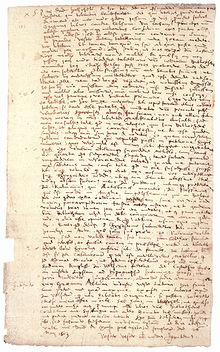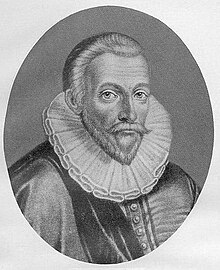Jan Gruter

Jan Gruter ( Latinized Janus Gruterus , actually Jan de Gruytere ; born December 3, 1560 in Antwerp , † September 10 or 20, 1627 at the Bierhelderhof near Heidelberg ) was a writer and polyhistor .
Life
Janus Gruter was a son of the Antwerp merchant and mayor Walter (Wouter) de Gruutere († 1588 in Danzig) and Catherine Tishem (Thysmayer) († 1595) from Norwich . Gruter's family fled to Great Britain during the Dutch War of Liberation. There Gruter studied law in Cambridge from 1577 . Later he moved to the University of Leiden , where he a. a. He became a student of Hugo Donellus and Justus Lipsius . In 1584 Gruter completed his studies with a doctorate to become Dr. iur. from. A kind of Cavalier tour followed his studies, which took Gruter to many universities in Germany, France, Italy and Switzerland in almost five years. This academic wandering came to a temporary end at the University of Rostock . Here he held historical lectures from 1586 and also frequented Gdansk.
The philologist Gruter, who was recognized among scholars at the time, reached the University of Wittenberg via a special vote in 1590 . Here he succeeded Andreas Frankenberger as Professor of History. In 1591 Gruter wrote his first important work "Suspicionum libri IX" in Wittenberg, which was a collection of critical remarks on various Latin authors such as Plautus, Seneca and Apuleius. After the death of Elector Christian I of Saxony , the Saxon church order of 1580 was suspended and the members of the Wittenberg University had to put their approval of the concord formula in a lapel. In the process, almost half of the teaching staff at the philosophical faculty also fell victim. So did Gruter who, as a representative of moderate humanism, did not want to sign it for reasons of conscience.
Gruter went to the University of Heidelberg , where Elector Friedrich IV of the Palatinate had appointed him as a professor of history. Here he found himself in the circle of young scientists and writers with Martin Opitz , Georg Michael Lingelsheim , Kaspar von Barth and Julius Wilhelm Zincgref . In Heidelberg, Gruter headed the Bibliotheca Palatina from 1603 as the successor to Paul Melissus Schede . As such, in collaboration with Marcus Welser and Joseph Justus Scaliger, he was also able to publish a comprehensive collection of all known Roman inscriptions at the time.
When Johann von Tilly and his troops took Heidelberg in 1622 , Gruter was forced into exile. Shortly after the conquest of the city, the papal envoy Leone Allacci managed to confiscate almost the entire Bibliotheca Palatina and large parts of Gruter's private library and bring them to Rome . Almost all of them are still there today as part of the Vatican libraries .
Gruter was married four times and lost women and children to plague and illness. The collection of the Vatican Library in Rome contains the epithalamium (wedding poem) " Clarissimo juris utriusque Doctori Domino Jano Grutero Sponso " by Anton Praetorius for Jan Gruter on the occasion of his wedding to his third wife Katharina Stöckle from Speyer on May 10, 1601 in Heidelberg .
Jan Gruter died at the age of 67 on September 10 or 20, 1627 in Bierhelderhof near Heidelberg.
Works
Among other things, Gruter published anthologies of works by European poets and proverbs, a world history and a collection of inscriptions, as well as collections of poetry. He occasionally used the anagrammatic pseudonym Ranutius Gherus in his publications .
Gruter's works can be found in all major libraries. The catalogs of the British Library in London list 73 and the Bibliothèque nationale de France 80 of his works. There are 117 titles in the current VD 17 online catalog .
Editions
- Wilhelm Kühlmann et al. (Ed.): The German humanists. Department 1: The Electoral Palatinate. Volume I / 2: Janus Gruter . Brepols, Turnhout 2005, ISBN 2-503-52017-0 (collection of texts on the literary and editorial work of Gruter in the context of the reception of ancient and medieval literature)
literature
- Conrad Bursian : Gruter, Jan . In: Allgemeine Deutsche Biographie (ADB). Volume 10, Duncker & Humblot, Leipzig 1879, pp. 68-71.
- Peter Fuchs: Gruter, Jan. In: New German Biography (NDB). Volume 7, Duncker & Humblot, Berlin 1966, ISBN 3-428-00188-5 , pp. 238-240 ( digitized version ).
- Leonard Forster: Janus Gruter's English years. Studies in the continuity of Dutch literature in exile in Elizabethan England (= Publications of the Sir Thomas Browne Institute . Special series, 3). University Press, Leiden 1967
- Gottfried Smend: Jan Gruter. His life and work. A Dutchman at German universities, the last librarian at the old Palatina in Heidelberg . Bonn University Printing Works, Bonn 1939
- Heinz Kathe : The Wittenberg Philosophical Faculty 1502–1817 (= Central German Research. Volume 117). Böhlau, Cologne / Weimar / Vienna 2002, ISBN 3-412-04402-4 .
Web links
- Publications by and about Jan Gruter in VD 17 .
- Works by and about Jan Gruter in the German Digital Library
- phil-fak.uni-duesseldorf.de
- Online version by Jan Gruter: Inscriptionvm Romanarvm corpvs gradtissimvm (1616) of the Heidelberg University Library
Individual evidence
| personal data | |
|---|---|
| SURNAME | Gruter, Jan |
| ALTERNATIVE NAMES | Gruytere, Jan de; Gruter, Janus; Grutherus, Ianus; Ranutius Gherus; Ranvtivs Ghervs |
| BRIEF DESCRIPTION | Writer and polyhistor |
| DATE OF BIRTH | December 3, 1560 |
| PLACE OF BIRTH | Antwerp |
| DATE OF DEATH | September 10, 1627 or September 20, 1627 |
| Place of death | Bierhelderhof near Heidelberg |
